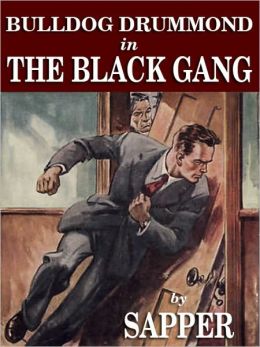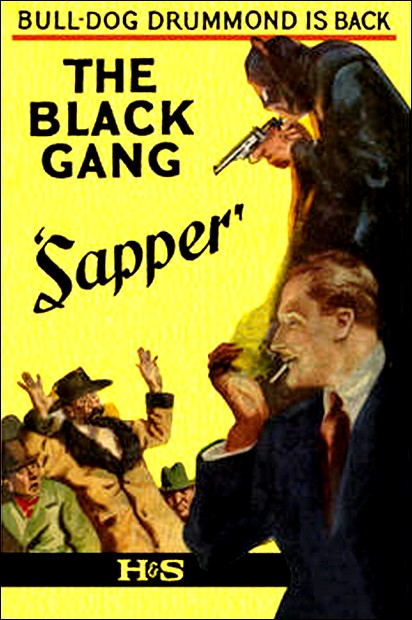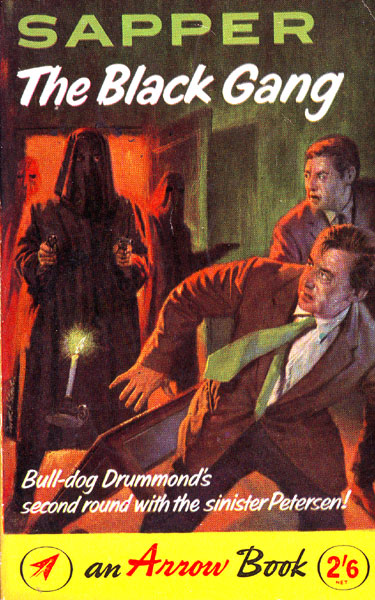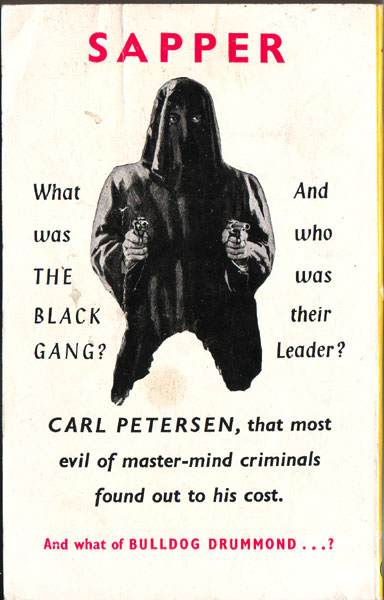Blogging Sapper’s Bulldog Drummond, Part Three – The Black Gang

 The most striking feature of the second Bulldog Drummond thriller by Sapper is the near complete removal of humor from the proceedings compared with the frequent light touch demonstrated with the initial book in the series. There is also precious little mention of the First World War, which was such an important factor in the first book, as the focus here is much more on the reaction against the Russian Revolution and the fear of a similar Communist uprising occurring in Britain during the early 1920s. Once more the influence of Edgar Wallace’s Four Just Men series is strongly felt, particularly in the first half of the book, where the Black Gang are featured anonymously with no mention of their true identities.
The most striking feature of the second Bulldog Drummond thriller by Sapper is the near complete removal of humor from the proceedings compared with the frequent light touch demonstrated with the initial book in the series. There is also precious little mention of the First World War, which was such an important factor in the first book, as the focus here is much more on the reaction against the Russian Revolution and the fear of a similar Communist uprising occurring in Britain during the early 1920s. Once more the influence of Edgar Wallace’s Four Just Men series is strongly felt, particularly in the first half of the book, where the Black Gang are featured anonymously with no mention of their true identities.
Many critics label this second entry in the long-running series as fascist. I suppose that is an understandable reaction to a vigilante storyline in which it is suggested Britain would benefit from modifying freedom of speech to deny protection to political radicals. The Black Gang is very much a Machiavellian work, but one which seeks to restore order at its conclusion by having Hugh Drummond agree to dismantle the Black Gang and let the law sit in judgment over criminals going forward. Of course with such a finale as this, one wonders why Sapper bothered to take the proceedings to such an extreme in the first place.
The success Edgar Wallace enjoyed with his own vigilante series was undeniably an influence, but the author’s underlying motivation appears to have been his genuine outrage over the slaughter of the Russian Royal Family, the Romanovs, and the belief that those behind the Bolshevik movement were not fervent followers of Communism, but rather unprincipled villains eager to exploit the utopian ideology to put themselves in positions of power. Sapper wanted to see the threat of Communism put down and could only envision such a task being accomplished by private citizens working outside the law.

 Politics aside, there is still joy to be had in the book, particularly the sequence in which Hugh Drummond is hunted at night on the grounds of Maybrick Hall where Carl Peterson has set up camp. The grounds are surrounded by an electrified fence and Drummond would appear to be a sitting duck as half a dozen armed guards and a ferocious hound beat the bushes for him. Drummond behaves with a savagery rarely seen outside of Edgar Rice Burroughs’ earliest work as he swings out in the darkness and hurls his pursuers (including the dog) into the electric fence, where they meet a swift death. His ghastly laughter reverberates through the bush as one by one he picks off the men sent to hunt him down.
Politics aside, there is still joy to be had in the book, particularly the sequence in which Hugh Drummond is hunted at night on the grounds of Maybrick Hall where Carl Peterson has set up camp. The grounds are surrounded by an electrified fence and Drummond would appear to be a sitting duck as half a dozen armed guards and a ferocious hound beat the bushes for him. Drummond behaves with a savagery rarely seen outside of Edgar Rice Burroughs’ earliest work as he swings out in the darkness and hurls his pursuers (including the dog) into the electric fence, where they meet a swift death. His ghastly laughter reverberates through the bush as one by one he picks off the men sent to hunt him down.
Drummond fans will delight in the more substantial role played by Chief Inspector MacIver of Scotland Yard. While the character is still very much a supporting player here, he will figure in more prominent roles in the subsequent books and also made the transition to the silver screen as Colonel Nielsen in the long-running movie series. Sharp-eyed readers will note the books remain uncertain whether he is an Inspector or Chief Inspector and whether his surname is spelt MacIver or McIver. The re-christening of the character as Nielsen was a nod to Sapper’s true surname of McNeile combined with his literary antecedent. Consistent with the literary series’ continuity confusion, the movie counterpart likewise carries the rank of either Colonel or Inspector, depending on the film.
Additionally, readers are given an insight into Hugh Drummond’s background with the introduction of Sir Bryan Johnstone, the head of the CID, who had been at school with Drummond years before. The nature of their relationship turns on the fact that at school, Drummond was Johnstone’s fag. Lest anyone misunderstand the meaning, the modern sexist slur was derived in part from the British term for an underclassmen who acted as a servant to an older boy at school. British public school life was explored in greater detail in Tom Brown’s Schooldays by Thomas Hughes for those who are curious to learn more of the concept and that of the once traditional role of the school bully.
While the second half of the book does feature a bit of screwball banter between Hugh and his newlywed bride, Phyllis; Drummond’s relationship with his wartime cronies lacks the sparkle that was such a valued component in the first book. The scenes with Hugh’s butler, Denny, are particularly painful to read as Drummond is positively abusive to the poor man. This is in keeping, one must admit, with the darker, grittier feel of the second book where Drummond and his mates set out to wage their own private war on the traitors perpetrating acts of terror in the UK.
The nationalism of the first book is replaced by an unrelenting anti-Communist stance that drains this first sequel of much of what made the original so memorable. Consequently, Sapper’s decision to allow Carl Peterson and Irma to make yet another last minute escape at the conclusion appears to badly fumble the Great Game being played between protagonist and villain that is essential to the success of many pulp series. Rather, the reader is left feeling cheated of their lust for blood in seeing vigilante justice done.
There is one nice nod to “The Red Headed League” to be found in the first half of the book. It stands as the sole reminder of the influence of Conan Doyle’s Sherlock Holmes adventures upon the series. The first book relied a great deal upon evoking images of Professor Moriarty when featuring Carl Peterson to the extent that the deliberate move away from Conan Doyle’s long shadow appears jarring.
Doc Savage fans will note the fact that the Black Gang transport their political prisoners to an otherwise uninhabited island where they undergo deprogramming and rehabilitation so they may return to capitalist life. Happily, with the Black Gang retired by the conclusion of the adventure, a lighter touch could be hoped for Drummond’s Third Round with Carl Peterson.
William Patrick Maynard was authorized to continue Sax Rohmer’s Fu Manchu thrillers beginning with The Terror of Fu Manchu (2009; Black Coat Press) and The Destiny of Fu Manchu (2012; Black Coat Press). The Triumph of Fu Manchu is scheduled for publication later this summer.